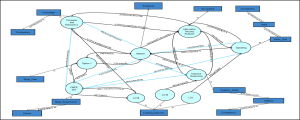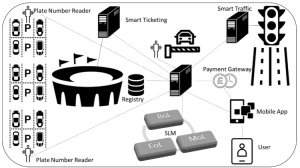Teaching
Graduate Courses
-
- CMPS672 – Enterprise Information Systems
Enterprise Information Systems are usually based on packaged software products that drive for cross-functional integration and require organization-wide resources for their implementation. Enterprise systems impact multiple levels of the enterprise, ranging from the individual members, to the entire organization and even its associated supply chain network. This course is designed to provide a comprehensive insight into theoretical foundations, concepts, tools and current practice of enterprise systems. Project based Entreprise Information system tools, such as ERP, PLM, WMS… are used to understand the basic Supply Chain operational information components. Presentations by company experts is also proposed.
- CMPS569 – Software Project Management
This course introduces projects and project management as applied to software systems: project selection, research methods, managing progress and change, project planning (activities, schedules and cost management), leadership and team work, project quality management, project risk management, project review and reflection. Team works and projects are conducted and supervised. Students learn about best practices that address the development and management of software products and services covering the product lifecycle concepts.
- CMPT524 – Semantic Web
This course presents the semantic web motivations, concepts and ideas. It covers the foundation of semantic web (XHTML, XML and XML-related tools such as DTD, XML Schema, XSL Transformations, and XPath) and semantically rich languages such as RDF the Web ontology Language (OWL); but also Rules, and some Reasoning techniques. Students gain understanding of the most challenging problems and what progress has been made towards solving current semantic web problems.
- DENG602 – Applied Research Methodology
- CMPT609 – Seminar In Computing
- CMPT695 – Master Thesis
- CMPT691 – Master Project
- DENG-699 – PhD Thesis
- CMPS672 – Enterprise Information Systems
Undergraduate Courses
-
- CMPT393 – Modeling and Simulation
This course introduces discrete event simulation models to the students. it presents the high-level simulation models and then advanced modeling and analysis, based on programming and interfacing languages. ARENA simulation software is used to provide a comprehensive treatment of simulation concepts in general and to help predicting and measuring system strategies for efficient and optimized performance. Practical demonstrations are shown in different field applications, including computer applications and supply chain modeling. The students learn how to apply the simulation models and programs to real-world complex situations.
- CMPT151 – Programming Concepts
This course exposes students to problem solving techniques and operations on data using the fundamental components of a programming language. They use algorithmic techniques to develop algorithms for simple problems and translate them to a computer program and learn how to write, test and debug simple computer programs to solve problems using programming concepts and principles of structured and (some) Object-Oriented Programming (OOP).
- CMPS307 – Intro. to Project Management & Entrepreneurship
Introduction to entrepreneurship, and elements of business management with emphasis on managing software and information and communication technologies projects. Concepts of project management; project plan development, progress tracking, staffing, leadership, conflict resolution; organization, costs, risks, control; entrepreneurship, basics of owning and operating a business, business plan development for starting and financing a small business.
- CMPS310 – Software Engineering
- CMPS485 – Computer Security (partially)
- CMPS373 – Computer Graphics
- CMPS466 – Information Retrieval
- CMPS493 – Senior Design Project
- CMPT393 – Modeling and Simulation
Sample of Master Theses
-
-
ICT industry integrated curricula: Towards an Ontology Based Competency Model – 2014/2016
As technology advances rapidly, the ever changing industry needs for skills and competencies keeps changing in efforts to seize the nearest competitive advantage. This creates a great burden on higher education institutions to accurately be able to supply what the industry currently demands. Understanding and analyzing the gap between the supplied and demanded competencies has been always a topic of debate and research between both domains of knowledge. In this thesis, we propose to develop an ontology that would help in identifying the gap between the employee and occupation competencies. The objective is to be able to generate the gap analysis utilizing the ontology and provide users with information that would help them in gaining more knowledge about the domain and taking informative decisions based on facts. Two separate ontologies representing classes and object properties of the Education and the Industry domain have been successfully modeled. The validation shows that the ontology correctly classifies the employees as Fit or Un-fit to the set of occupations they applied for according to the competency gap analysis.

-
Sample of Senior Projects
-
- Smart city services interconnection – 2016/17
Smart City services and applications are well known to address problems of high levels of urbanization. The project is dedicated to the link between smart city services using internet of thing platform. It is proposed to model the exit flow from Smart Parkings (service 1) and connect it to a Smart Traffic (service 2). The first step is related to the detection of the cars going outside several parkings and heading to gates towards different directions (through plate numbers readers). Then, the Smart parking node communicates the needed information to the Smart traffic node. The next step is related to the intelligent management of the Traffic signals according to the cars flow in each direction. To insure the probability between the two systems, the Open Group IoT Standards O-MI (Message Interface) and O-DF (Data Format) will be used. Based on previous relationship with Aspire Zone – Qatar

